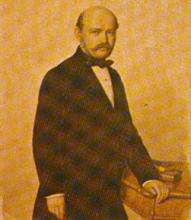Nature of the Puerperal Fever
To give birth was seen as an illness and involved great risks.
In 1789 the French Revolution started and the Declaration of the Rights of the Man appeared.
In 1865, Ignez Semmelweiss, responsible for the discovery of the nature of the puerperal fever was murdered in a private psichiatric hospital in Budapeste.
The University of Viena Hospital, at the time, was the biggest in the world.
Women gave birth at home, and the women that went to the hospital did so frightened, only doing so because the child born there could be adopted by the State.
There were two infirmaries for the pregnant women. In one the births were assisted by midwives, in other by teachers and students. To have a baby in the teacher’s infirmary was equivalent to a death sentence. Semmelweiss asked himself why.
One day something new happened: his teacher, making a necrospy of one of the pregnant women who died, cut himself when handing the scalpel to one his students. He developed all the symptoms of the women and died in 15 days. His necropsy showed the same signs of the women. Semmelweiss defines the illness as puerperal fever and believes that something passes from the dead body to the women by the smell that impregnates the hands of the dissecting doctors. It is the “miasma”. He starts to experiment with different substances that would take the smell off the hands. He washes and scrubs them until he arrives at hipochlorite. He believes that his discovery will be disseminated and well thought of. He starts to make all medicine students wash the hands before examining the patients. He comes in conflict with his colleagues.
With the reaction against him, he goes back to Budapeste, where he was born, and starts working in his private clinic and at the faculty. He starts to write and to publish his researches. He becomes more and more aggressive, calling the doctors murderers.
Semmelweiss, an Hungarian, had lived in Vien during Hungary’s revolt against the Austro-Hungarian Empire. Even if he was not political, he was seen with mistrust by his fellows. This, together with his revolt against the medical indifference, ends by making him “damned”. He is committed as mentally ill and ends by being murdered.
By his discovery of antissepsy, he is considered the father of mother medicine. Vien University has his name.
That in short is the story of the changing position of childbirth by those that call themselves “civilized”. From warrior and reppressive Europe they have imposed their will on the Indians, blacks, “savages and ignorant” peoples from the rest of the world.
